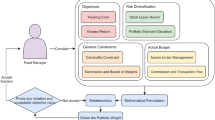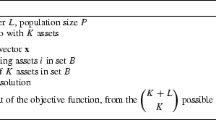Abstract
Index-tracking is a low-cost alternative to active portfolio management. The implementation of a quantitative approach, however, is a major challenge from an optimization perspective. The optimal selection of a group of assets that can replicate the index of a much larger portfolio requires both to find the optimal subset of assets and to fine-tune their weights. The former is a combinatorial, the latter a continuous numerical problem. Both problems need to be addressed simultaneously, because whether or not a selection of assets is promising depends on the allocation weights and vice versa. Moreover, the problem is usually of high dimension. Typically, an optimal subset of 30–150 positions out of 100–600 need to be selected and their weights determined. Search heuristics can be a valuable alternative to traditional methods, which often cannot deal with the problem. In this paper, we propose a new optimization method, which is partly based on Differential Evolution (DE) and on combinatorial search. The main advantage of our method is that it can tackle the index-tracking problem as complex as it is, generating accurate and robust results.
Similar content being viewed by others
References
Beasley, J. E., Meade, N., & Chang, T. J. (2003). An evolutionary heuristic for the index tracking problem. European Journal of Operational Research, 148, 621–643.
Deb, K., Pratap, A., Agarwal, S., & Meyarivan, T. (2002). A fast and elitist multiobjective genetic algorithm. IEEE Transactions on Evolutionary Computation, 6(2), 182–197.
Focardi, S. M., & Fabozzi, F. J. (2004). A methodology for index tracking based on times-series clustering. Quantitative Finance, 4, 417–425.
Fogel, L. J., Owens, A. J., & Walsh, M. J. (1966). Artificial intelligence through simulated evolution. New York: Wiley.
Gilli, M., & Këllezi, E. (2002). The threshold accepting heuristic for index tracking. In P. Pardalos & V. Tsitsiringos (Eds.), Financial engineering, e-commerce, and supply chain. Boston: Kluwer Academic.
Holland, J. H. (1975). Adaptation in natural and artificial systems. Ann Arbor: University of Michigan Press.
Kennedy, J., & Eberhart, R. C. (1995). Particle swarm optimisation. In Proc. of the 1995 IEEE international conference on neural networks (Vol. 4, pp. 1942–1948). New York: IEEE Press.
Kirkpatrick, S., Gelatt, C. D., & Vecchi, M. P. (1983). Optimization by simulated annealing. Science, 220, 671–680.
Krink, T., & Paterlini, S. (2009). DEMPO—differential evolution for multiobjective portfolio optimization. Computational Management (accepted).
Krink, T., Filipič, B., Fogel, G., & Thomsen, R. (2004). Noisy optimisation problems—a particular challenge for differential evolution? In Proceedings of the sixth congress on evolutionary computation (CEC-2004) (pp. 332–339). New York: IEEE Press.
Krink, T., Paterlini, S., & Resti, A. (2007). Using Differential Evolution to improve the accuracy of bank rating systems. Computational Statistics & Data Analysis, 52/1, 68–87.
Maringer, D., & Oyewumi, O. (2007). Index tracking with constrained portfolios. Intelligent Systems in Finance, Accounting and Management, 15, 57–71.
Maringer, D., & Parpas, P. (2009). Global optimization of higher order moments in portfolio selection. Journal of Global Optimization, 4, 219–230.
Michalewicz, Z., & Fogel, D. B. (2004). How to solve it: modern heuristics. New York: Springer.
Paterlini, S., & Krink, T. (2006). Differential evolution and particle swarm optimisation in partitional clustering. Computational Statistics & Data Analysis, 50/5, 1220–1247.
Rechenberg, I. (1973). Evolutionsstrategie: Optimierung Technischer Systeme nach Prinzipien der Biologischen Evolution. Stuttgart: Frommann-Holzboog.
Storn, R., & Price, K. (1997). Differential evolution—a simple and efficient heuristic for global optimization over continuous spaces. Journal of Global Optimization, 11(4), 341–359.
Ursem, R. K. (2002). Diversity-guided evolutionary algorithms. In J. J. M. Guervs et al. (Eds.), LNCS : Vol. 2439. Proc. 7th int. conf. parallel problem solving from nature, Granada, Spain. Berlin: Springer.
Vesterstrøm, J., & Thomsen, R. (2004). A comparative study of differential evolution, particle swarm optimisation and evolutionary algorithms on numerical benchmark problems. In Proc. of the sixth congress on evolutionary computation (CEC-2004) (pp. 1980–1987). New York: IEEE Press.
Author information
Authors and Affiliations
Corresponding author
Rights and permissions
About this article
Cite this article
Krink, T., Mittnik, S. & Paterlini, S. Differential evolution and combinatorial search for constrained index-tracking. Ann Oper Res 172, 153–176 (2009). https://doi.org/10.1007/s10479-009-0552-1
Published:
Issue Date:
DOI: https://doi.org/10.1007/s10479-009-0552-1




